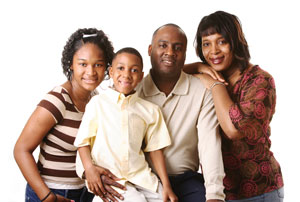One Love Provides One Stop HIV Info for African-Americans
California state officials and HIV advocacy groups have teamed up to establish a Web site that focuses exclusively on the impact of HIV/AIDS and other health disparities on African-Americans.
California state officials
and AIDS prevention and testing advocacy groups have teamed up to establish
a Web site that focuses exclusively on the impact of HIV/AIDS and other
health disparities on African Americans.
The One Love California Web
site (www.oneloveca.org) was designed as an educational resource
to coordinate statewide prevention services, epidemiological data, research,
policy discussions and links to other relevant information. It also
provides access to technical assistance and training opportunities for
organizations and public agencies, state officials say.
"It’s a great Web site
and will be extremely beneficial," said Jena Adams, a coordinator
with the Fresno County Department of Public Health who also chairs the
Sacramento/Central Valley Regional Coalition. "It’s a great place
to send people for information on statistics or upcoming events."
In 2007, the California Department
of Public Health – Office of AIDS launched a strategic response to
the rising rate of HIV/AIDS among the state’s African-American
population. Although they make up only 7 percent of the
state’s population, African-Americans represent almost 20 percent
of all AIDS cases in California.

One Love, a project of ONTRACK Program Resources, was funded by the
Office of AIDS as a component of the state’s strategic
response. The One Love project provides technical assistance
and training to increase the capacity of AIDS prevention service providers
and coalitions to effectively reduce the impact of AIDS among African-Americans.
"It has made our work so
much easier," said Nosente Uhuti, a regional coordinator for Inland
Empire in San Bernardino. "Our region views it as an opportunity to
develop resources in our community. It’s a really accessible resource
for our clients. If they don’t have access, it’s really easy [for
our staff] to pull information for them."
The site is also helpful to
AIDS prevention professionals who seek information.
"When developing policy,
it’s necessary to know the history and who’s already done the research
so that we’re not trying to reinvent the wheel," said Uhuti.
According to Jamal Bey, One
Love project manager, the site targets the audiences most at risk for
HIV/AIDS and the prevention workers who serve them – high-risk African-American women and African-American gay men and non-gay identified
men who have sex with men.
The site will also support
regional collaboration among various organizations’ HIV prevention
efforts. In addition, Bey says the site will increase the amount of
community-based research activity and accessible data among African-
American communities.
"I haven’t seen a site
that is this comprehensive," said Bey. "I pull up the Web site every
day. It has policy tools and advocacy kits that people can utilize."
Included among the research
is work by leading African Americans in the HIV/AIDS field, such as
Dr. Gayle Wyatt, a sex behaviorist at the University of California-Los
Angeles; Nina Hara, Ph.D, an assistant professor and researcher at Charles
Drew University of Medicine and Science; Dr. David Malebranche, assistant
professor at the Division of General Medicine at Emory University’s
School of Medicine; and Greg Millett, a behavioral scientist for the
Centers for Disease Control and Prevention.
Bey noted that the site eventually
will add podcasts that let organizations know what their counterparts
in different regions are doing.
Bey says the site can be helpful
in assisting African-American groups who may be struggling to find funding to help them continue to work for their
communities.
He says the site could help
community groups and organizations become more active in HIV/AIDS policymaking
decisions. "It’s important to have tools necessary for informed
decision making and so that organizations have a greater impact to serve
communities more effectively," Bey said. "We, as African Americans,
are not in the policy making conversations. We usually respond once
the policy is set. Until we have a say in policy, we’ll always be
in a reactive mode instead of a proactive one."
